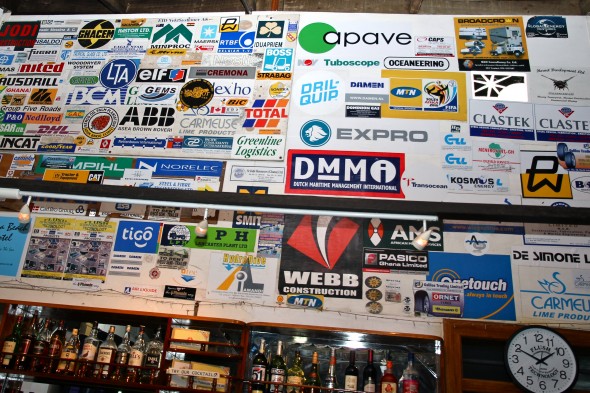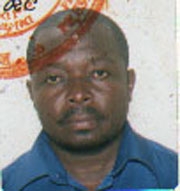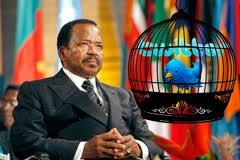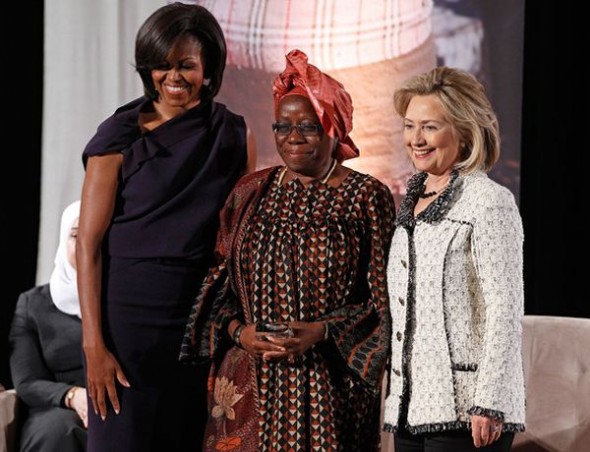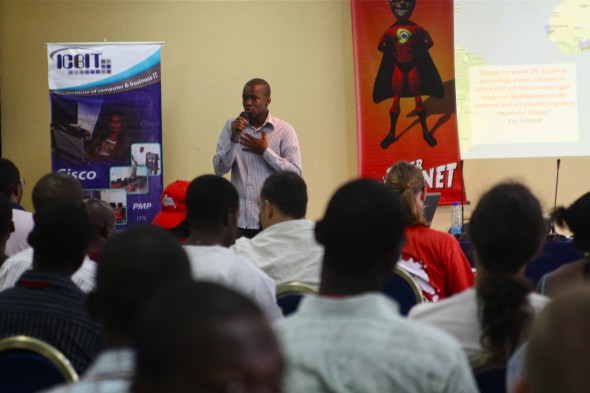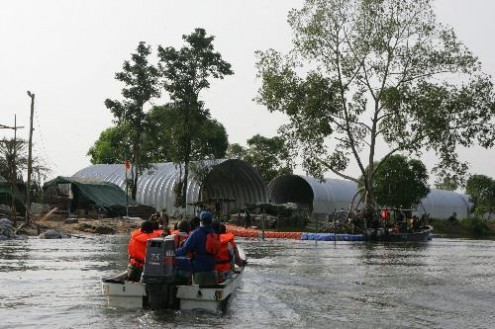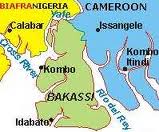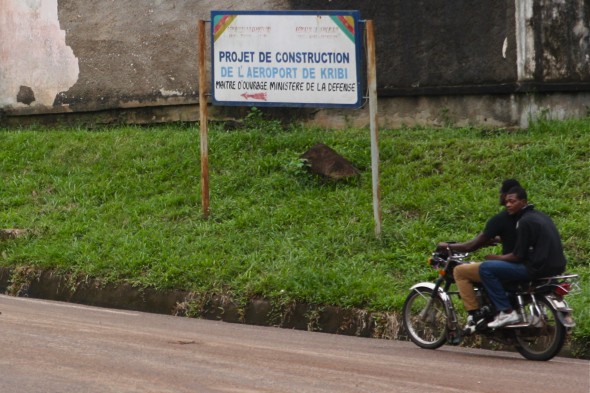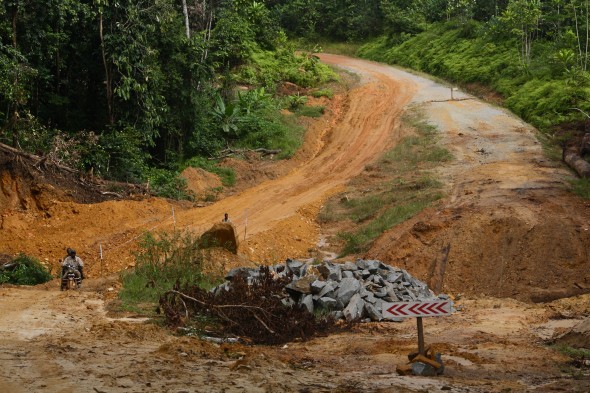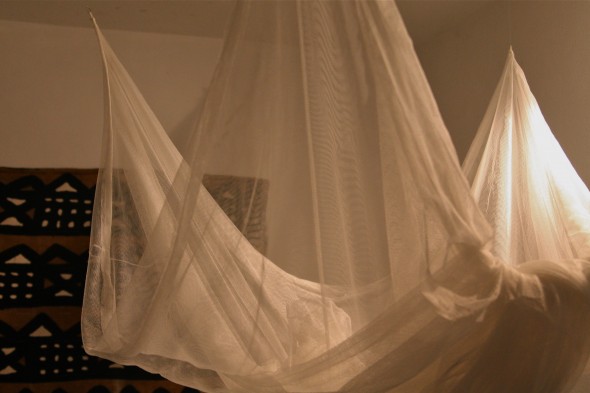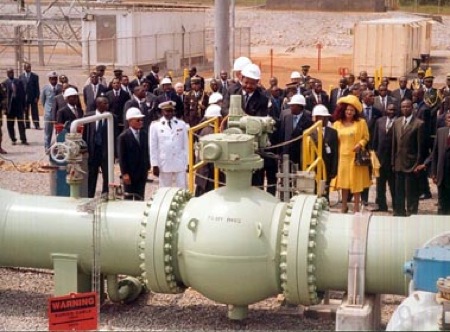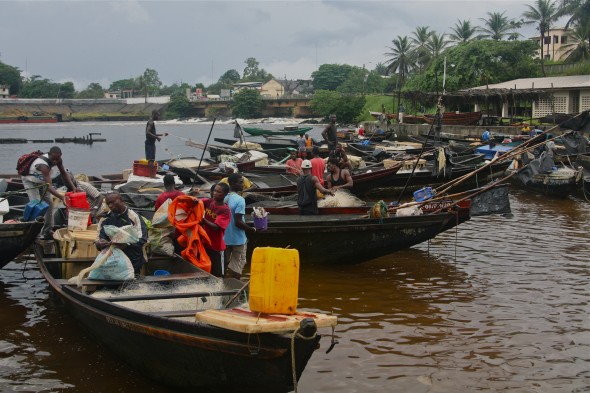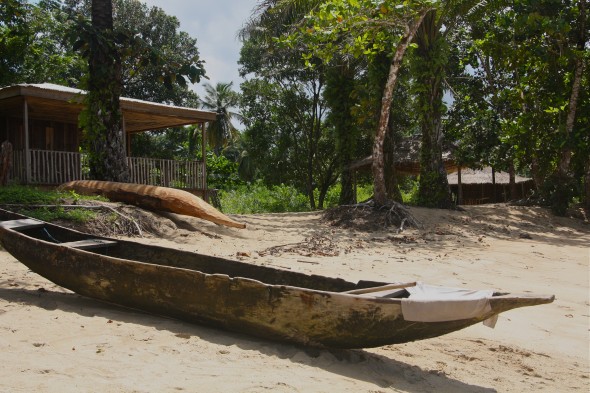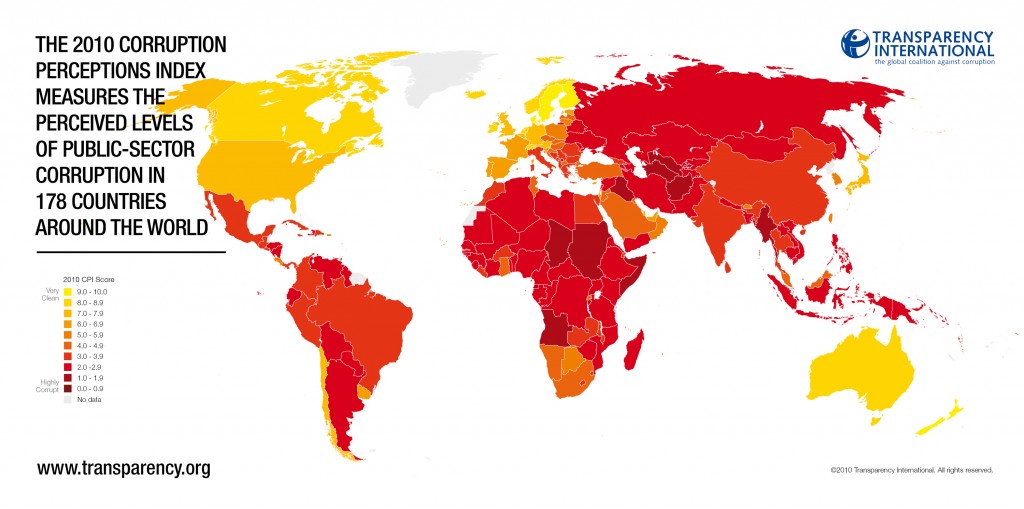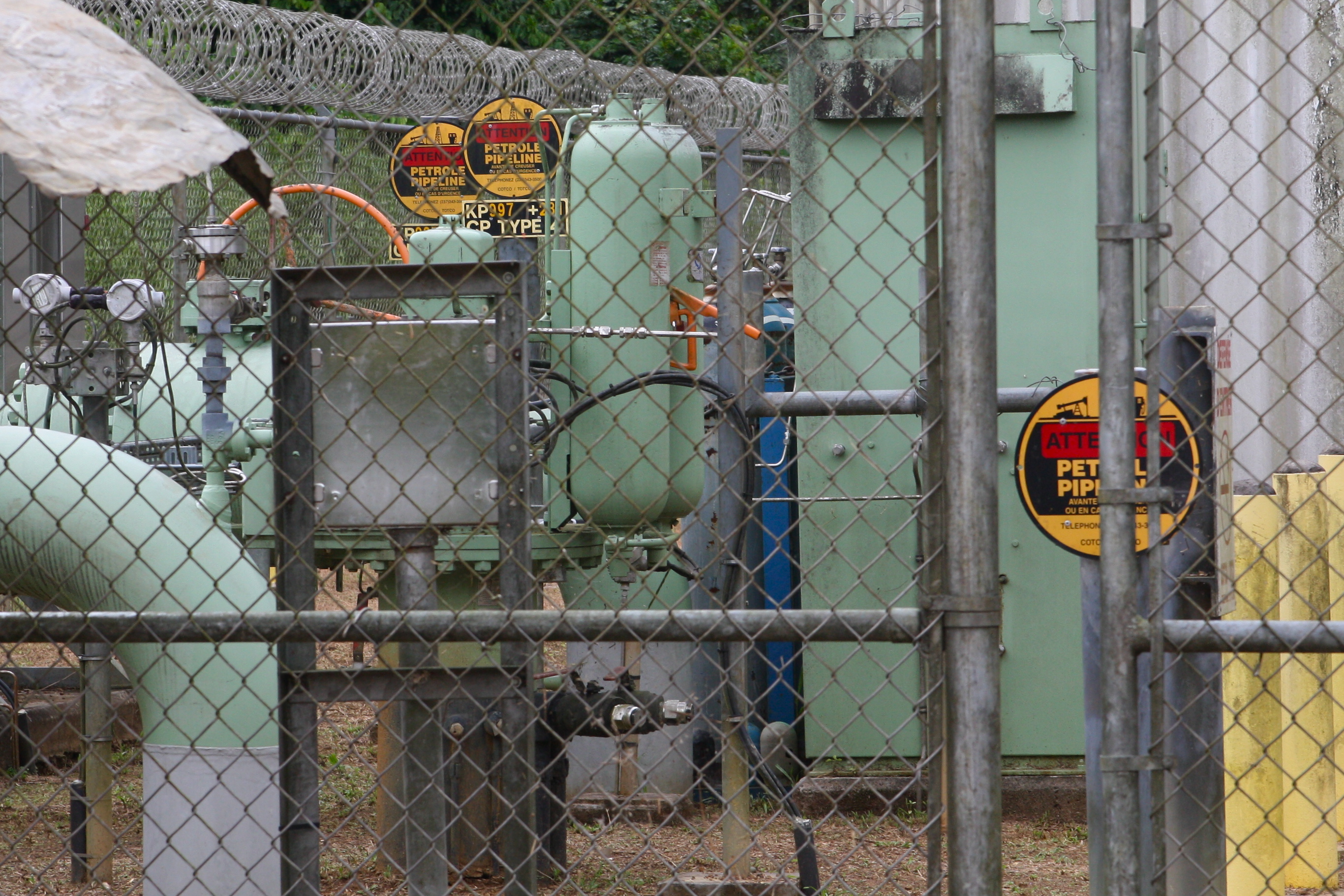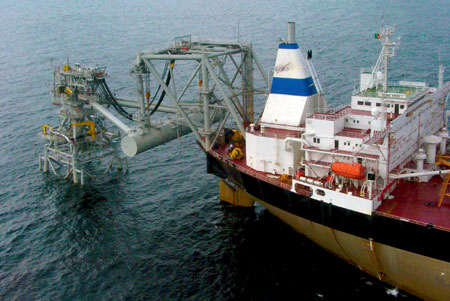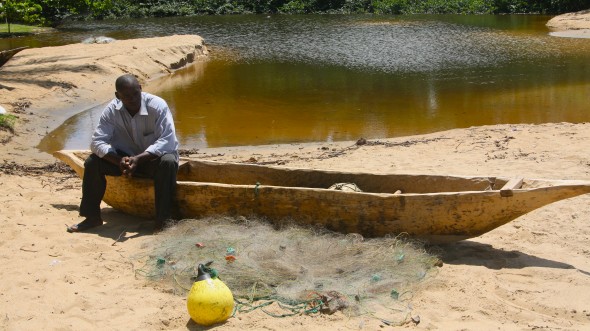It’s been awhile…
Days turn into weeks and I haven’t posted a thing. I guess I’ve got those oil blues…
Well, that and I have been editing video and preparing an article for publication. If all goes as planned, new material should be online in the next few days. I’ve also been to London to interview Stuart Wheaton, Ghana Development Manager for Tullow Oil, and Romain Chancerel, Project Manager for the Global Initiative for West and Central Africa (GIWACAF). GIWACAF is a public-private partnership working to develop and enhance oil spill response capacity in the Gulf of Guinea region.
Gulf of Guinea: The new Wild West
Reuters ran a story several months ago on the key political risks of doing business in the Gulf of Guinea.
I posted the article then. The article has been updated and I’m putting it up once again. As I said when I originally posted this article, most coverage of the extractive industries (and cocoa, in the case of this article) is in the business pages and basically boils down to dollars and cents. What are the rewards, what are the risks?
The human side of the story is only of interest insofar as it impacts business and the investment climate. Ditto for the environment. What’s noteworthy here is that there is absolutely no mention of the the environmental risk of rapidly expanding drilling and mining. Kind of crazy when you consider that environmental mayhem will certainly lead to social unrest. Even from an investment perspective, one might think (wish?) that environmental concerns would be part of the risk assessment.
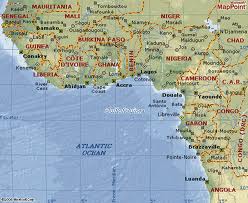 DAKAR May 3 (Reuters) – A stretch of West Africa’s coast spanning more than a dozen countries, the Gulf of Guinea is a growing source of oil, cocoa and metals to world markets.
DAKAR May 3 (Reuters) – A stretch of West Africa’s coast spanning more than a dozen countries, the Gulf of Guinea is a growing source of oil, cocoa and metals to world markets.
But rising rates of piracy, drug smuggling, and political uncertainty in an area ravaged by civil wars and coups have made it a challenging destination for investors seeking to benefit from the massive resources.
The Gulf of Guinea runs from Guinea on Africa’s northwestern tip to Angola in the south and includes Nigeria, Ghana, Ivory Coast, Democratic Republic of Congo, and Cameroon.
Committee to Protect Journalists calls for justice in Cameroon
One year ago, Cameroonian journalist Germain Cyrille “Bibi” Ngota Ngota died in his Kondengui Prison cell. Denied medical attention, Ngota’s death was murder by abandonment (the government denied this allegation and “proved” through its own inquiry that Ngota died due to his poor health). The Committee to Protect Journalists (CPJ) spoke out at the time and, one year later, is again demanding justice and reform.
Censored: Cameroon’s first Human Rights Film Festival
The first Human Rights Film Festival of Cameroon was shut down before it even started. On opening night, about 30 minutes before the first screening, the authorities arrived at the cinema with two anti-riot buses and announced the festival was cancelled. They claimed the festival organizers had not secured the proper authorizations.
Henriette Ekwe, still a troubling presence in Cameroon
Political activist, journalist, publisher of the weekly independent paper, “Bebela” (truth) Henriette Ekwe was one of ten women to receive the “International Women of Courage” award in Washington, D.C. on March 8th. Ekwe, whose political activism spans decades, was the only Cameroonian (and only African woman) honored this year.
Journalists, fans and family members came to the Douala airport to welcome her home on March 17th. Ekwe dedicated the award to her father, 100, who “came to visit her every morning in prison,” even though he was over 80 years old at the time. She also dedicated the award to Cameroon’s independent journalists and the many U.P.C. militants who lost their lives fighting for freedom and whose names have been erased from the country’s official history. Continue reading . . .
Bakassi hostages freed
The Cameroonian hostages seized in the Bakassi region on February 6th have been freed, according to the Cameroonian government.
An AFP article has more details: Cameroon says hostages seized in Bakassi freed
An update, also from AFP, quotes an unnamed source close to the government who confirms that Cameroon paid approximately 320,000 Euros in ransom for the release of the hostages: Cameroun: 320.000 euros de rançon
Thoughts on Egypt…looking south
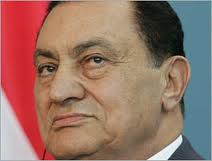 Mubarak has resigned and Egyptians are dancing in the streets. The road ahead will be bumpy and Egyptians will face many challenges, but what the people have achieved today is truly breathtaking. Amazing, absolutely amazing. And, twenty years to the day after Nelson Mandela walked out of prison, a free man! Remember: February 11th is a special day.
Mubarak has resigned and Egyptians are dancing in the streets. The road ahead will be bumpy and Egyptians will face many challenges, but what the people have achieved today is truly breathtaking. Amazing, absolutely amazing. And, twenty years to the day after Nelson Mandela walked out of prison, a free man! Remember: February 11th is a special day.
Of course, I can’t help but think what implications Mubarak’s resignation may have for those leaders south of the Sahara who have also been in power for decades and who, seemingly, have no intention of vacating their posts. Continue reading . . .
Cameroon negotiating release of Bakassi hostages
It was important enough for President Biya to cut short his Swiss holiday, so here’s the reprint from AFP:
YAOUNDE — Cameroon authorities have opened negotiations for the release of 13 officials kidnapped in the disputed Bakassi peninsula, a source close to the security service said Wednesday.
The 13 officials, including the region’s sub-prefect, were taken hostage earlier this week in two attacks that also killed two police paramilitaries.
A government spokesman on Wednesday confirmed the number of kidnapped at 13. Earlier it was believed 11 people had been kidnapped. Continue reading . . .
Election Year Flurry of Public Works (announcements)
Bridges, dams, hydroelectric plants, roads and railways! In Cameroon every day seems to bring another announcement of an ambitious, much-needed and long-overdue public works project. Before long the country will be buzzing with activity and from Kribi to Douala, Limbe, Yaounde and beyond, Cameroon will be on the fast track to development, heading for middle income status by 2035 (You can download the government working paper, Cameroon Vision 2035, or read about it at African Economic Outlook).
The Chinese, the French, the Americans and the World Bank are all announcing projects and loan packages for infrastructure and industry — certainly many lucrative deals are on the horizon. There’s just one catch, though. This is Cameroon and it’s an election year.
All sorts of promises get made during an election year — that’s politics everywhere, I imagine. But Cameroonians have watched their president make hollow promises for decades. Drive along any road and you’ll see signs announcing public works projects. Sometimes the signs indicate the duration of the work, “36 months”, but don’t include a start- or end-date. Or you’ll see a start-date, but nothing else. Either way, it’s often a sign next to nothing or next to a pile of rubble that looks like it’s been there, untouched, for months. So, understandably any announcement today will likely be perceived as nothing more than “effet d’annonce” (hype).
Thinking about offshore drilling
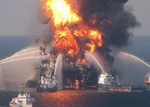 This morning I read Investigation into BP Spill Reveals Incompetence, Greed, Complacency and Cynicism — It’s Time for a New Energy Policy, by Michael Brune, Executive Director of the Sierra Club. The brief article discusses, Deep Water: The Gulf Oil Disaster and the Future of Offshore Drilling, the final report from the Obama-appointed investigative commission. Although the report and its recommendations concern the U.S., it is easy to see the significance for Africa, where oil offshore drilling is on the rise.
This morning I read Investigation into BP Spill Reveals Incompetence, Greed, Complacency and Cynicism — It’s Time for a New Energy Policy, by Michael Brune, Executive Director of the Sierra Club. The brief article discusses, Deep Water: The Gulf Oil Disaster and the Future of Offshore Drilling, the final report from the Obama-appointed investigative commission. Although the report and its recommendations concern the U.S., it is easy to see the significance for Africa, where oil offshore drilling is on the rise.
I’ve recently posted information about the Scottish company, Bowleven, and its new oil finds off the coast of Cameroon. This is no small story: exploration over the past few months indicates that these discoveries are even more promising than initially thought. And Cameroon is not alone. There are new finds in Nigeria. Ghana is now pumping offshore oil. From Sierra Leone to Angola, the entire Gulf of Guinea region is poised for major, new offshore development. Africa, and in particular the Gulf of Guinea, is one of the new oil “hot spots” attracting both the major oil companies (American, European, Chinese and Brazilian) and the “minnows” or “wildcats,” the smaller, independent companies who used to “explore-discover-sell,” but are now getting in on the drilling action, too. Spend a few minutes reading the trade papers and you’ll quickly get a sense that this is the new Wild West.
There’s money, and lots of it, to be made offshore. I remember reading once that the oil business in Equatorial Guinea worked well for the Americans. With all the activity offshore, work crews could be helicoptered in every few weeks. No need to get too close to the abysmal situation on the ground in the country. Oil money fuels the corruption, repression, income inequality and political instability in the country, but the offshore drilling continues without a hitch.
So far, at least. What we hear little about are the environmental risks and dangerous lack of regulation, oversight and response capability that are unfortunately the norm for much of the offshore drilling in the Gulf of Guinea. As I mentioned in a post several weeks ago, I’m looking into the oil spill response plans of Cameroon and other countries in the region. I have yet to see anything reassuring.
More to follow.
Paul Biya’s New Year’s Wishes
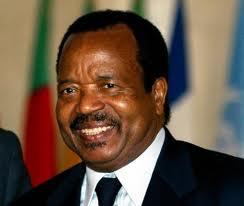 Cameroon’s president Paul Biya sent out his annual New Year’s message on December 31st.
Cameroon’s president Paul Biya sent out his annual New Year’s message on December 31st.
It was a generally positive message, with much emphasis on the 2010 implementation of the “ten-year growth and employment strategy, the first phase of (Cameroon’s) journey towards emergence.”
Of course for Cameroonians, who have been listening to Biya deliver solemn messages to the nation for 28 years, it’s probably hard to get excited about yet another growth and development plan. As for the “journey towards emergence,” that’s a reference to the 2009 governmental “vision” report that calls for Cameroon to become an emerging economy by 2035. Considering that Cameroon is now slowly emerging from a twenty-year economic slump, that’s quite a challenge.
In many ways the country is worse off today than it was two decades ago and although there are many reasons for Cameroon’s economic woes, corruption and cronyism have done serious damage to the country’s economy. With Biya at the helm since 1982, it’s easy to understand why many Cameroonians don’t pay too much attention to these messages.
Nonetheless the message did give a sense of where the country could be headed, most notably regarding electricity-generating projects (Cameroon’s potential for growth in many areas is limited by a lack of electricity). Biya cited several power projects including the Lom Pangar hydroelectric dam, which he described as being “on schedule”. This is one project I’ll be looking at as it will flood a section of the Chad-Cameroon pipeline and it’s unclear who will pay for the recommended pipeline reinforcements.
In the coming months we’ll see how much of this New Year’s message translates into real action on the ground and how much if it turns out to be empty declarations made with an eye towards the upcoming presidential elections. Unfortunately there are many electrification projects, roads and other infrastructure projects that look good on paper, sometimes even get started only to be left unfinished — or in a perpetual state of “under construction.”
The English version of Biya’s address is posted here.
A few end-of-the-year thoughts
Another year comes to an end, and along the Chad-Cameroon oil pipeline not much has changed. Well there are new mosquito nets, but besides that you will be hard-pressed to find any positive developments for local populations.
The government of Chad continues to collect oil revenues, but apparently is unable to use them to benefit Chadians. Of course the time for believing that the country’s oil wealth would be put to good use is long gone, but it would still be nice to be surprised. With both parliamentary and presidential elections scheduled in 2011, perhaps Deby will decide to put some of the country’s oil money (approximately US$ 5.7 billion earned from project start to July 2010) towards development.
More likely, however, Chad’s oil money will continue financing arms and the military. Deby increased military spending by an astonishing 663 percent between 2000 and 2009, made possible, of course, by oil. And with new Exxon drilling, as well as the Chinese oil projects in the country, there will be plenty of oil money for the foreseeable future.
In Cameroon no one expected the pipeline to bring much wealth to the country (pipeline earnings account for somewhere between 2 and 4% of the Cameroonian budget), and it is unlikely that anyone was waiting for oil money to be spent responsibly. But people hoped, and were assured by the project partners, that the pipeline would not make things worse. Unfortunately, for too many people living along the pipeline, life is harder today than it was before oil arrived.
But there is some encouraging news: the U.S. legislation passed this summer requiring S.E.C. registered extractive industries companies to disclose all payments to governments is an important step towards increased transparency. Transparency is not an end in itself, but is part of an equation that will hold governments accountable and increase the chances that resource revenues are spent wisely. As I said, Chad has elections in 2011 and so does Cameroon (a presidential election in October). Neither Chad nor Cameroon are known for being democratic and there’s no reason to be overly optimistic. However, it’s an interesting moment in the history of “françafrique” and the ongoing electoral crisis in Ivory Coast may very well have implications throughout the region.
Pipeline: Cameroon earns 277.6 million U.S. dollars in seven years
I came across an interesting article that appeared in the Cameroonian daily, Mutations, on December 28th. At a ceremony launching a COTCO-sponsored mosquito net distribution campaign, Guillame Kwelle, the COTCO public and governmental affairs manager, announced that Cameroon had earned nearly US$ 278 million from the pipeline.
Really?
There has been little financial information made available by the Cameroonian government since the pipeline became operational and critics of the project have often pointed to the total lack of transparency regarding Cameroon’s earnings. How much money does the pipeline actually bring in and where does it go? The earnings from the pipeline are part of Cameroon’s petroleum revenues, but there is no data available that would allow people to see what percentage of those revenues comes from the pipeline — as opposed to other oil operations — nor is there any way to know how those revenues are spent. Even if the transit fees are fairly easy to calculate (a fixed, per barrel fee), all the other assorted taxes and fees are harder to estimate. So, this announcement at a COTCO public relations event is newsworthy.
Foreign Aid for Scoundrels
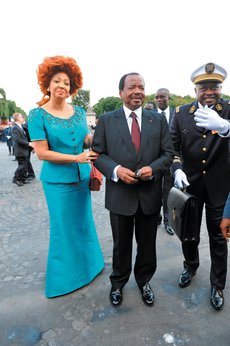
Cameroon’s President Paul Biya, center, with his wife Chantal Biya at a Bastille Day parade on the Champs Elysées, Paris, July 14, 2010. Photo: Orban Thierry/Sipa Press
Foreign Aid for Scoundrels by William Easterly | The New York Review of Books.
William Easterly has written an article in The New York Review of Books that seems fitting for reading on International Anti-Corruption Day. Easterly writes about the “dirty secret” of the international aid system: “Despite much rhetoric to the contrary, the nations and organizations that donate and distribute aid do not care much about democracy and they still actively support dictators. The conventional narrative is that donors supported dictators only during the cold war and ever since have promoted democracy. This is wrong.”
Cameroon and Paul Biya feature prominently in the article. Easterly points out $35 billion in foreign aid during the Biya era have led neither to poverty reduction nor growth in Cameroon. “The average Cameroonian is poorer today than when Biya took power in 1982.”
You can read more by Easterly on the “Aidwatch” blog: http://aidwatchers.com/
Kribi: Major industrial developments on the horizon
Take a nice look at Kribi’s quaint fishing port. It may be unrecognizable in a few years.
After many years of talks and delays, the Cameroonian government appears to be moving ahead with the Kribi deepwater port project, the first step of a major industrial development program.
A recent dispatch from Chinese state radio announced that the Cameroonian government will soon begin a US$50 million compensation program for residents on the site of the future port. According to the article, “The Kribi deep water port in southern Cameroon will be constructed on a 26,000 acres piece of land. It will have an industrial complex with four terminals as well as a mineral wharf for exporting iron. According to the construction timetable, the general excavation works are expected to begin in December.”
No details are provided on the nature of the compensation or the number of people who will be displaced by the project.
The port is not the only major development on the horizon. Work is already underway on Kribi’s gas thermal power plant, which is expected to become operational sometime in late 2012.
Is there a connection between the Chad-Cameroon oil pipeline and the proposed industrial development around Kribi? That depends how you define “connection.”
Corruption Index
Transparency International has released its 2010 Corruptions Index. Chad ranks among the ten most corrupt countries in the world. Cameroon has made some progress — just a few years ago the country was at the bottom of the ratings — but is still mired in corruption.
Corruption was a problem in both Chad and Cameroon before Exxon began drilling. Organizations opposed to the World Bank’s involvement in the project warned that rampant corruption would certainly impact any poverty alleviation plans. They were right, but the World Bank knew this, too…which brings us back to the Bank’s crackdown on corruption. You can stop doing business with companies that bribe officials, but as long as those officials operate in a culture of impunity you’re not reducing corruption.
Definitions of corruption
Defining corruption is not as simple as one might think. The Asian Development Bank (ADB) website provides some interesting information on the definitions of corruption: “As a shorthand definition, ADB defines corruption as ‘the abuse of public or private office for personal gain.’ A more comprehensive definition is as follows: ‘Corruption involves behavior on the part of officials in the public and private sectors, in which they improperly and unlawfully enrich themselves and/or those close to them, or induce others to do so, by misusing the position in which they are placed.'”
I recently posted an article about anti-corruption efforts at the World Bank. I found the article interesting and the efforts of the Bank worth noting. However the fight against corruption has to go a lot further than crackdowns on bribery to be effective. If the Bank really wants to fight corruption, it has to work towards a cultural shift, supporting capacity-building measures that can help countries move away from a culture of impunity and towards the rule of law.
Worse, at times it appears that the Bank plays a double role: crackdowns on bribery and fraud on one hand, enabling projects that reinforce the status quo on the other.
Licence to probe: World Bank trains its sights on corruption crackdown
This is significant news from the World Bank so I’m posting the entire Guardian article below. I tend to agree with the author’s assessment: this is an important step in the right direction, but there’s a long, long way to go. I’m looking into non-compliance on aspects of the loan agreements with Chad and Cameroon that have not been effectively enforced. Avoiding obligations—with no apparent consequences—is not corruption. But it certainly doesn’t help advance the rule of law. And what better for corruption than a culture of impunity? I’ll be posting more about this soon.
Article by Larry Elliott, guardian.co.uk, October 8 2010

The World Bank’s latest anti-corruption initiative may sound a bit Bond, but it shows issues like fraud and bribery are being taken seriously. Photograph: Reuters
It will have 250 staff operating out of 150 countries and sounds like Ian Fleming dreamed it up. Yet the International Corruption Hunters Network (ICHN) is not something out of a James Bond novel, but the World Bank‘s latest initiative for stamping out bribery, fraud and the pilfering of money designed to alleviate poverty.
The idea is a good one. There are countless individual agencies around the world dedicated to stamping out financial crime: pooling their expertise should make it more difficult for the venal to get away with it. And not before time, since the taxpayers who last year provided the $70bn-plus spent by the World Bank in the field need to know that their money is not finding its way into numbered Swiss bank accounts or swelling the profits of unscrupulous companies.
Oil…A Pipeline to Prosperity?
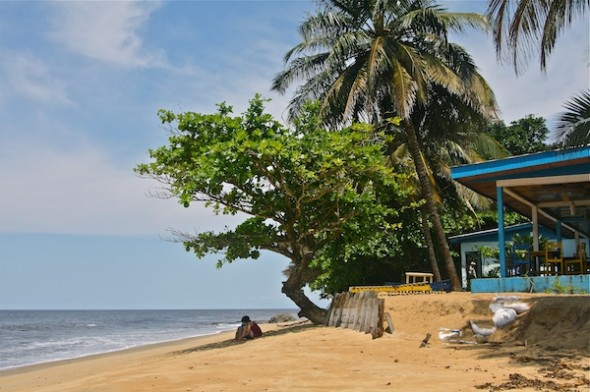
Tourists at Bume Beach, opposite the pipeline's marine loading terminal. Photo by Christiane Badgley
I have produced a short film for PBS/Frontline World to mark the 10th anniversary of World Bank engagement in the Chad-Cameroon Oil Development and Pipeline Project. Cameroon: Pipeline to Prosperity? revisits the story of the “model” oil for development project. Ten years ago the oil companies and the World Bank promised that this project would break the resource curse and prove to the world that oil could be a force for good…
What has happened? Watch the film to see how Chad’s oil has impacted life along the pipeline in Cameroon.
This work was produced with support from Frontline World, The Pulitzer Center on Crisis Reporting and The Center for Investigative Reporting.
Cameroon: Pipeline to Prosperity? is the first installment in my ongoing exploration of Africa’s booming oil industry, Pipe(line) Dreams. You can read more about the project on the website.
Please support my work on this project by viewing the film and leaving your feedback. It is crucial to show funders that this work matters!
The U.S. now imports more oil from Africa than from the Middle East, with oil accounting for more than 80% of all African imports into the country. African is soon expected to account for close to one quarter of U.S. oil consumption.
With Africa increasingly seen as the next frontier of oil exploration, there is no shortage of oil companies lining up for financing from the World Bank Group. Oil drilling has begun in Ghana with support from the World Bank Group; loans may soon be approved for Uganda. New oil has been found in Chad, Cameroon, Nigeria, Angola — even Sierra Leone. The list goes on, with government and corporate officials in each country promising to make oil work for the people.
But in countries lacking accountability, with weak legal systems and lax or nonexistent environmental regulation and enforcement, is oil really a viable development option? And is there a valid reason that public funds subsidize these projects? Both the U.S. and China depend heavily on African oil, yet we rarely see anything about how that oil dramatically transforms African communities, economies and environments. Pipe(line) Dreams, a timely and globally relevant story, will bring much needed attention to the rapidly expanding oil industry in Africa.
Oil Spill near Kribi, Cameroon
A new oil spill was reported at the marine loading terminal offshore from Kribi at 1:45 am on April 22nd.
According to COTCO, the “minor spill” occurred during a violent storm. The transfer of oil from the loading terminal (FSO) to a waiting tanker was halted due to bad weather. High waves washed some “residual oil” from the deck of the waiting tanker. Again, according to COTCO, less than five barrels total were spilled and the oil was immediately cleaned up.
No oil has been reported on the coast, but fishermen did report seeing a sheen of oil offshore.
Several Cameroonian NGOs have released a statement deploring the lack of communication between COTCO and the local populations as well as the lack of any statement or information from the Cameroonian government. The Comité de Pilotage et de Suivi des Pipelines (CPSP), the Cameroonian authority responsible for the pipeline, has not made any public comments regarding the spill. With no information from the government and no journalists allowed near the marine loading terminal, it is extremely difficult to verify COTCO’s information.
In November 2009 the Cameroonian government adopted a national oil spill response plan. This plan, required by the World Bank, should have been in place before oil began to flow along the pipeline in October 2003. The Cameroonian government has not made the plan public and many civil society activists believe the plan remains non-operational. Samuel Nguiffo, from the Center for the Environment and Development, points to the unfolding disaster in the Gulf of Mexico as a warning: “It is urgent that the government increase its capacity to respond to a disaster and make the oil spill response plan operational.”
In the event of a major spill, several million barrels of oil could end up in the Atlantic ocean 12 km. off the coast of Kribi, Cameroon’s main tourist destination and an important fishing and sea turtle nesting zone. The thought of a spill anywhere is terrifying, but watching what’s going on in the Gulf of Mexico now makes me extremely uneasy about Cameroon. Of course the situation in the Gulf is particular, but one clearly sees that controlling an oil spill, even with the best equipment and ample manpower, is incredibly difficult. Any significant spill at the marine loading terminal in Kribi would likely be an ecological (and economic) disaster of major proportions.
It’s important to remember that the offshore marine loading terminal at Kribi (the FSO), is a single-hulled refurbished tanker. Today all tankers, including those used as FSOs, must be double-hulled — an additional protection against spills.
Crude Awakening, Part two
The World Bank-supported Chad-Cameroon oil pipeline looks a lot different on the ground than it does from offices in Washington, D.C. Is the project a success? Depends who you ask!
One thing is certain: the controversy surrounding the “model” oil development project has hardly died down.
This video looks at ongoing compensation problems around Kribi, Cameroon. The Cameroonian Oil Transportation Company, COTCO (ExxonMobil), is responsible for compensating locals for lost lands and revenues.
Traveling from the fishing village of Bumé where locals have been suffering since pipeline construction crews destroyed their fishing grounds, to the Bagyeli pygmy villages in the rainforest, where the Bank-mandated, “Indigenous Peoples’ Plan”, has been stalled for years, I met one angry resident after another.
Today people are especially frustrated as they feel they have no recourse. The government is unresponsive; COTCO (ExxonMobil) is unresponsive. There’s nowhere for people to go with their complaints. It seems the world has forgotten about the Chad-Cameroon oil pipeline.
News from Washington
I’ve recently returned from Washington, D.C., where I was able to interview World Bank and other officials about the Chad-Cameroon Oil Development Project.
Very interesting…
I’m now editing some video sequences and will post material soon.
2010 A New Year
Fragile existence. This is the story of life along the pipeline. Whatever happens to the global economy, the price of the barrel or ExxonMobil’s profits in 2010, life here will remain difficult. But the oil won’t stop flowing any time soon and as long as the pipeline is operational, there are opportunities for progress.
Peoples’ voices will be heard, their stories shared. Increased awareness, increased transparency, pressure from stockholders – these are all real possibilities that can lead to change. Oxfam has been actively involved in efforts to promote transparency in the extractive industries, for example, and recently launched a “Follow the Money” campaign. The Extractive Industries Transparency Initiative is moving forward.
Of course any change on the ground will be minimal at best, but let’s all work to make 2010 a year with a bit more social and environmental justice where it’s needed most.

